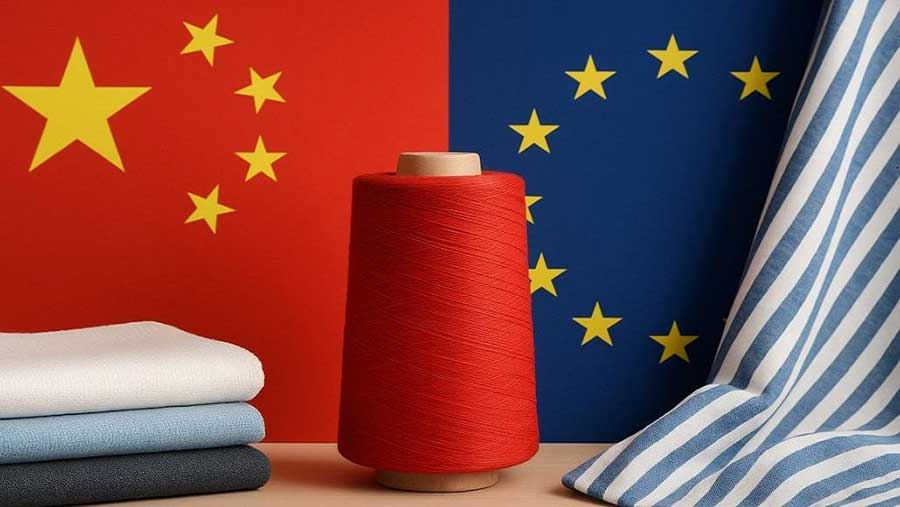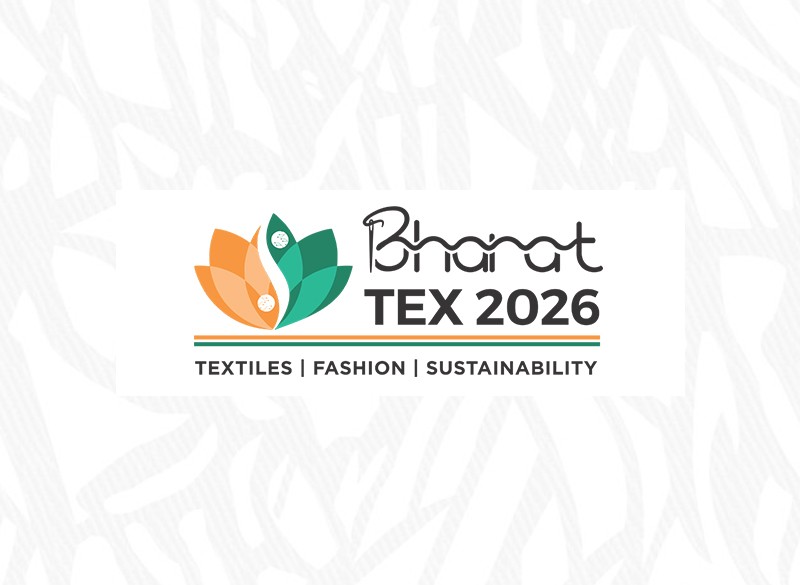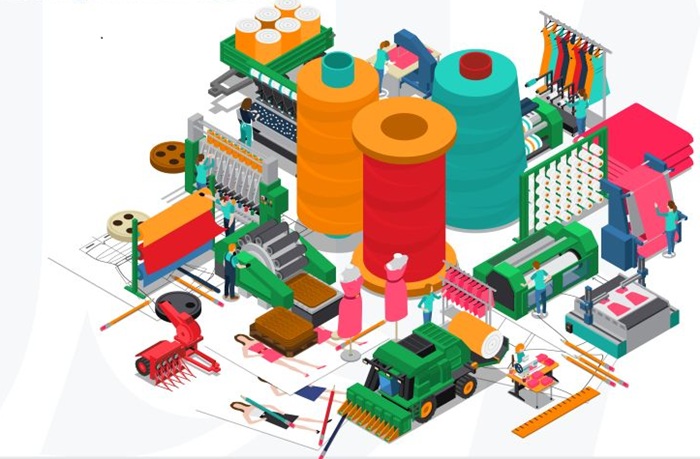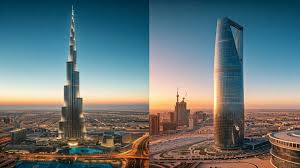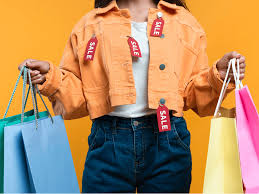FW
Top spinners in Bangladeshi have urged the government not to increase gas price in phases in one go but to phases it out as the sector is facing challenges due to the import of cheaper yarn and fabrics from India and China. A proposed 130 per cent hike in gas prices for captive power plants which the spinners use for continued power generation, will badly hurt the sector, they say. The hike will push up the price of gas from Tk 8.36 to Tk 19.26 per cubic metre.
They feel the proposed hike is abnormally high and will be difficult for spinners to absorb price shocks in the current volatile situation. It may be recalled the government had already raised the price of gas for captive power plants from Tk 4.36 per cubic metre to the current rate last September. Bangladesh Energy Regulatory Commission will hold a public hearing on the gas price hike proposed by Titas Gas Transmission and Distribution Company Ltd on August 7 and 8.
The construction of a textile park at Irur village on the Tiruchi-Perambalur National Highway is to start by October as all the preliminary works have been taken up for the transfer of land to the State Industries Promotion Corporation of Tamil Nadu (SIPCOT). The proposal of the textile park has attracted a large number of entrepreneurs with as many as 31 of them from different parts of the state expressing interest to set up units. One of them has demanded allocation of five acres of land to set up a readymade garments unit.
Interestingly, the textile park will mainly cater to the needs of export-oriented readymade garments units and production of yarn. A number of entrepreneurs have submitted their projects to set up T-shirt manufacturing units. To support the textile park, the Tamil Nadu Water Supply and Drainage Board has planned to provide water supply to the site where the park situated on an area of 40.35 hectares – 36.79 hectares of government poramboke land is to be constructed.
Also a sum of Rs 65 lakh has been sanctioned for laying a tar road from the National Highway to the site. The proposal was mooted as early as 2012 and suffered various bottlenecks particularly with regard to the selection of a site. However, the park would not handle dyes and chemicals to prevent environment pollution.
For Q1 ended June 30, Welspun, Indian Home Textiles Manufacturers and Exporters posted a 10.29 per cent rise profit on a year-on-year basis. Net sales rose to double digits at 11.30 per cent to to touch Rs 1,386.46 crores for the quarter under review as against Rs 1,245.6 crores in the same period in the last fiscal. In a BSE filing, the company said of the Rs 800 crores the company had planned to invest as capital expenditure in fiscal 2016-17, it has already spent Rs 140 crores in the reporting quarter.
The annual capacity of towels is expected to reach 72,000 metric tons by end of the current fiscal as against 60,000 posted at end of the earlier fiscal. As far as bed linen was concerned the company would have capacity of 90 million mt. compared to 72 million mt.
"Shanghai Garment Trade Association Network (SGTAN) periodic statistical report shows that in June 2016, Shanghai's top 10 shopping malls sold 680,000 (sets) of clothing categories, a decrease of 34,000 (sets), a decline of 4.7 per cent but an increase of 300 (sets). In June 2016, sales of clothing categories stood at 295 million yuan, a decrease of 32 million yuan, a decline of 9.7 per cent; down 012 million yuan, down 4.0 per cent month on average sales price of 433.9 yuan / piece (set), a decline of 17.0 per cent, down 4.0 per cent."
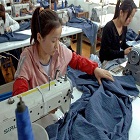
Shanghai Garment Trade Association Network (SGTAN) periodic statistical report shows that in June 2016, Shanghai's top 10 shopping malls sold 680,000 (sets) of clothing categories, a decrease of 34,000 (sets), a decline of 4.7 per cent but an increase of 300 (sets). In June 2016, sales of clothing categories stood at 295 million yuan, a decrease of 32 million yuan, a decline of 9.7 per cent; down 012 million yuan, down 4.0 per cent month on average sales price of 433.9 yuan / piece (set), a decline of 17.0 per cent, down 4.0 per cent.
Sales continue to plummet
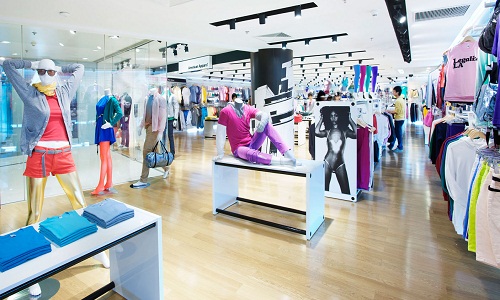
Shanghai Garment Industry Association data network indicates that the apparel consumption was down due to rainy season. As per June 2016 sales figures of most clothing categories there was a decline across the board. Among them, leather, knitting underwear, men's suits, wool (cashmere) shirt, women's fashion, men trousers, and men’s casual wear fell by over 20 per cent, while kid’s wear registered a growth of 52.0 per cent. From January to June 2016, 10 of Shanghai’s mall clothing categories recorded a dip in sales volume by 9.4 per cent year on year.
In the same period, sales of women's fashion was 1.096 million (sets), down by 19.3 per cent. In yuan terms total sales was 823 million yuan, down 12.7 per cent. The average selling price was 750.6 yuan / piece (set), an increase of 8.1 per cent. In June 2016, the top three brands were: 'Ya Ying' brand return to the top of the charts with sales growth of 4.6 per cent. 'Only,’ for the first time made it to the top three, ranked second with a growth of 38.8 per cent sales and 'Veromoda was third, with a decline.
In men's casual wear during the same period, cumulative sales were 225,000 (sets), down 21.7 per cent. Total sales was worth 151 million yuan, down by 16.3 per cent with an average selling price of 670.0 yuan /piece (set ), an increase of 6.8 per cent. In June 2016 the top three brands in terms of sales was: Lacoste on top with a growth of 19.6 per cent; Tommy Hilfiger, second and 'Beverly Hills Polo Club' brand for the first time made it to the top three.
In the same periods January to June 2016, cumulative sales of men's suits was 121,000 (sets), down by 3.8 per cent. Total sales was worth 169 million yuan, down by 6.5 per cent at an average selling price of 1,394.6 yuan / piece (set), down by 2.8 per cent. Te top three brands were: Callisto, Connie Weiss brand ranked second and Blue Leopard third.
In men's shirts for the same periods, cumulative sales was 69,000, down by 18.2 per cent. Total sales was 29.18 million yuan, down by 10.7 per cent with an average selling price of 420.7 yuan / piece, an increase of 9.1 per cent in 2016. As per June, sales top three brands were: Byford first followed by Conch and Younger brand third with sales down by 12.6 per cent.
Cumulative sales of men’s trousers were 48,000, an increase of 2.9 per cent with total sales worth 25.89 million yuan, an increase of 12.4 per cent. The average selling price was 534.1 yuan. In June 2016 top three brands were: Lang Ken, first with a decline of 42.2 per cent, Hong Chuan was second down by 6.9 per cent, Tiger for the first time made it to the top three with a strong growth of 27.6 per cent.
From January to June 2016, cumulative sales of children's clothing was 1,314,000 (sets), down 0.6 per cent; total sales was 358 million yuan, an increase of 5.3 per cent at an average selling price of 272.3 yuan / piece (set), an increase of 5.9 per cent. As per June 2016, sales the top three brands were: Nike with a growth of 23.3 per cent; New Balance was second with a growth of 62.0 per cent and 'E- land' won third place with a sales growth of 51.0 per cent.
INVISTA, one of the world’s largest integrated producers of polymers and fibres, has launched a seasonal denim offering by way of its COOLMAX® and THERMOLITE® PRO brands. The ‘summer jean’ and ‘winter jean’ are expected to revolutionise the future of denim and offer high performance technical alternatives to stiff, rigid and impractically uncomfortable denim fabrics. The ‘winter jean’ has been developed from denim made with THERMOLITE® Infrared technology that increases its temperature when exposed to solar or artificial light.
Unique fibres made with ceramic pigments absorb infrared rays and convert this energy into heat the body can feel while the fabric technology provides insulation and minimizes heat loss.
During summer, most denims become highly impractical due to their heavy weight and lack of breathability. Since 1986, COOLMAX® technology has added cooling and drying performance to fabrics used in active wear and outdoor apparel and now its adoption in denim is leading the way in performance ‘summer’ jeans.
When COOLMAX® yarn is adopted in denim fabrics, it creates a high-performance, light weight easy-care fabric that transports moisture away from the body to the outer cotton layer where it can evaporate and cool down the fabric, the wearer feels fresh, cool and dry.
The universal appeal of denim and its popularity continues to grow as casual wear gains acceptance in new environments including the office. Consumers with active lifestyles are embracing this next generation of denim due to its versatility and all-day comfort.
Mirza Azam, Bangladesh's minister of state for textiles & jute is looking for better trade relations with India and expects the International Textile Machinery Exhibition (ITME)s Society's upcoming fair in December to be held in Mumbai from December 3 to 8 would serve as a golden opportunity for improving trade between both countries. The first ever India ITME Society delegation to Bangladesh was led by chairman Sanjiv Lathia. Others in the delegation included Seema Srivastava, Executive
India's deputy high commissioner to Bangladesh, Adarsh Swaika, also attended the function that highlighted opportunities for collaboration and cooperation between India and Bangladesh in the textile sector. The Dhaka program was first of its kind promotional activity organised by India ITME Society creating an unique platform for better customer interaction and direct access to local market at prominent and upcoming textile hubs. Five companies participated in the promotional program
Pakistan’s minister for planning, development and reform Ehsan Iqbal has said that Chinese textile firms are keen to establish joint ventures with companies in Pakistan. As per a Pakistan Hosiery Manufacturers Association (PHMA) statement China’s labour intensive industries were becoming uncompetitive due to high production cost. And that is why they were shifting manufacturing to other locations while focusing on research.
Talking about China-Pakistan Economic Corridor (CPEC), Iqbal said it did not comprise of only Chinese financed projects. As a matter of fact, it has three types of projects including ones that are funded by the Chinese government. The minister said exports were the major source of foreign exchange earnings in the fast developing countries. He stressed the need to cross $150 billion by 2025; otherwise the country had no future. The minister lamented various deficiencies in adopting export-led growth approach.
Sri Lankan free trade zones are one of the most difficult areas in the world for trade union activities and organising workers. But despite workers facing severe anti-union and unfair labour practices from employers, IndustriALL affiliate the Free Trade Zone and General Services Employees Union (FTZ& GSEU) won a successful collective bargaining with Trelleborg Wheel Systems, the Sri Lankan subsidiary of a Swedish multinational manufacturer of tyres for agricultural and industrial machines.
The agreement, which covers about 140 workers in the factory, states that the employer will respect the right of each employee to become a member of the union, and prevent discrimination of employees due to union work.
Trelleborg Wheel Systems also agreed to create material and organisational conditions for union activity, including holding union meetings within the factory premises and time off for union office bearers to participate in union activities if notice is given. The union committed to carrying out its activities in a way that will not disturb the working time nor restrict the activity of the employer.
The agreement was signed recently and is retrospectively applicable for the period of 2014 to 2018. On fixing working hours, the company will discuss with the union and after reaching consensus the decision will be implemented by the management. It guarantees all statutory benefits on wages and working conditions and on certain provisions it goes beyond those statutory entitlements.
With the UK’s decision to exit Europe’s common market, Mauritius apparel export earnings is likely to be hit by about a 10 per cent, in line with the rupee’s appreciation against the pound. Britain remains the largest buyer of Mauritian goods within the EU, accounting for 18 percent of total exports to the bloc. Textiles are Mauritius’ top export to the UK.
About 90 per cent of Mauritius’ revenue from export of textile and apparel to the UK comes in pounds while imports are in U.S. dollars.
According to Yogesh Singh, Chairman, Mauritius Exports Association, textile and clothing sector will be the most hit by the Brexit. It will definitely have a significant impact on the Mauritian economy as it is the largest export sector of the country. Moreover, medium-sized companies will be hardest-hit.
The Mauritian currency has strengthened to 46.6 rupees per pound from 51.92 rupees when the electorate voted to leave the EU. The bloc takes up more than half of Mauritius’ exports, providing 25.6 billion rupees worth of sales. Meanwhile, the dollar’s appreciation since the referendum has inflated manufacturers’ import costs, causing a “double whammy.”
"China is gearing up to up production of eco-friendly clothing, a far-fetched dream a decade back. Studies point at Chinese consumers becoming more willing to spend on green clothes and products. The proof was evident at the recently held Intertextile trade show in Shanghai. Sherry Poon, Founder, Wobabybasics point out for the first time, they actually labelled which factories used eco or organic textiles, so they were easier to find. Wobabybasics, which uses entirely sustainable materials, was hailed as a top sustainable clothing brand by NGO Green Initiatives."

China is gearing up to up production of eco-friendly clothing, a far-fetched dream a decade back. Studies point at Chinese consumers becoming more willing to spend on green clothes and products. The proof was evident at the recently held Intertextile trade show in Shanghai. Sherry Poon, Founder, Wobabybasics point out for the first time, they actually labelled which factories used eco or organic textiles, so they were easier to find. Wobabybasics, which uses entirely sustainable materials, was hailed as a top sustainable clothing brand by NGO Green Initiatives.

Taking the green leaf ahead, Hong Kong-based textiles giant Esquel, the world’s largest shirt maker, has put been putting sustainability at the centre of its business. The company makes for retailers including Marks & Spencer, Ralph Lauren, and Tommy Hilfiger. To enhance eco-friendly measures, a new $300 million garment factory in Guilin has low-energy measures such as natural ventilation, and a commitment to zero discharge of wastewater, informed Edgar Tung, Head, Global Garment Operations, Esquel Group. In the last 10 years, the company claims to have reduced energy consumption per garment by 45 per cent and water consumption by 64 per cent. A recent Corporate Information Transparency Index, which evaluated 267 brands in China, ranked Esquel the second-best textile and apparels company, for its green supply chain, and fourth greenest among all companies.
At the recent Integral Conversation sustainability conference in Guilin, organised by Esquel, some of China’s biggest names came together to outline their work in green production. Conglomerate Far Eastern, which has operations in ten major industries including textiles, construction and retail, outlined how it has shifted focus to green materials, including what they claim is the world’s first 100 per cent bio-polyester shirt. According to Douglas Tong Hsu, chairman and CEO, Far Eastern Group, this is the way of the future. The company is focussed particularly on reduced-chemical products and recycling waste products.
Government’s green initiatives
The government is also supporting the cause and has launched the Green Manufacturing Association of China this year. This initiative will be driving companies towards automation as a part of the ambitious ‘Made in China 2025’ plan to modernise the country’s factories. Some of the most polluting factories have already shut down, say experts, often unwilling or unable to afford the costs of new environment requirements.
However, despite certain companies taking efforts, there’s a long way to go before they reach a milestone. There is lack of awareness from consumers about how environmentally damaging the industry can be, plus the upfront costs of eco-friendly production are higher and it is difficult to secure reliable green suppliers. Manufacturers also face stricter standards which haven’t always been adhered to, for example, the Global Organic Textile Standard (GOTS), which considers both environmental and social factors, requires refreshing every year. And despite the increasing automation of factories, a preference for cheap labour is still common.
Research suggests most Chinese manufacturers are not ready for the next stage of digital, sustainable manufacturing, ‘Industry 4.0’. McKinsey’s Forest Hou, stated that around 60 per cent of companies in China are still moving from 1.0 to 2.0, and there is a very weak base for lean management. Their research showed only 30 per cent of Chinese manufacturing companies were ready to consider smart manufacturing. While more than half were ‘followers’, suggesting that the government’s ‘Made in China 2025’ target to transform the manufacturing sector faces an uphill challenge. In the midst of all these, going green makes perfect sense as Esquel insisted that building their green manufacturing centre has actually saved them money in the long run, and that green manufacturing doesn’t have to be the domain of high-end goods.

